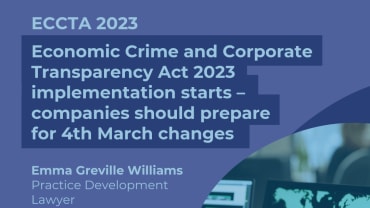It is both a positive and a negative that the UK has a global reputation for having a fast, easy and relatively inexpensive process to set up companies. Whilst this encourages entrepreneurship, experts say the downside to this is that the UK system is open to abuse, with the potential for people from all over the world to set up shell companies through which money can be moved around.
This latter point has been closely examined and on Friday 18 September 2020, the UK Government announced its intention to implement reforms to Companies House with a view to further reducing money-laundering and fraudulent activity. The reforms, which have been put forward as part of the Government's response to the Corporate Transparency and Register Reform Consultation published in 2019, will be of relevance to all UK companies. With that in mind, we have looked at some of the key points to note.
Compulsory identity verification process for directors and Persons with Significant Control (PSCs)
Perhaps the most significant of the reforms concerns the introduction of a compulsory identity verification scheme. The scheme is designed to increase the reliability of data shown at Companies House and assist law enforcement agencies investigating suspected fraud or money laundering.
The new verification process will be implemented primarily in relation to the appointment of company directors and the notification of PSCs. Notably, company directors will not be able to be officially appointed until their identity has been verified by Companies House.
This process will also operate retroactively, with existing directors and PSCs requiring verification. There will, however, be a transitional period to allow companies time to comply with the new reforms.
Companies House has sought to reassure those making the filings that the verification process will not be time consuming. Indeed, the suggestion is that it will only take a 'matter of minutes'.
The proposals connected to compulsory identity verification align themselves with the government's original aims and push for the levels of transparency which were sought with the introduction of the PSC regime. That being said, the process will have to be carefully considered in order to overcome regulatory and practical hurdles connected with the sharing of information before the process can be successfully achieved.
Greater powers for Companies House to query and investigate potentially false information
The Registrar of Companies will be provided with greater scope to make queries, conduct investigations and remove false information from the register. More details are still awaited with regards to what, exactly, these new measures will entail.
To complement this measure, any public or private body required to adhere to Anti-Money Laundering Regulations will now also have a duty to report any inconsistencies between the information they hold and the information as shown at Companies House.
Proposals have also been put forward which would enable the Registrar to query and thereafter reject company names prior to their registration.
Financial reforms at Companies House
Companies House are looking to improve the quality and consistency of the financial information available on the website. As such, several reforms have been put forward with regards to accounts and financial information.
The 'tagging' of companies' accounts is being explored. This process would allow software to analyse, collate and cross-reference data across different sets of companies' accounts. In this respect, Companies House has looked to other jurisdictions like Japan, USA and Europe with a view to establishing best practice.
Elsewhere, a limit on the number of times a company can shorten its accounting reference period is set to be introduced.
What are the main aims of the reforms?
Each of these measures will be implemented with the overarching aim of providing those relying on information held at Companies House with greater reassurance regarding the identities of those individuals with whom they are ultimately dealing. The measures will also assist law enforcement agencies tasked with tackling financial crime.
The Government has indicated that legislation enacting the reforms will be put forward when the Parliamentary calendar allows. It should be noted that there is also an intention on the part of the Government to introduce similar proposals for Limited Partnerships and Limited Liability Partnerships.
How can Brodies help?
The Brodies Corporate team regularly assists a large variety of businesses with their filing obligations at Companies House and is therefore well equipped with the expertise to guide you through this process smoothly. For further information, please get in touch with a member of the Corporate team or your usual Brodies LLP contact.
Contributors
Trainee Solicitor
Trainee Solicitor












